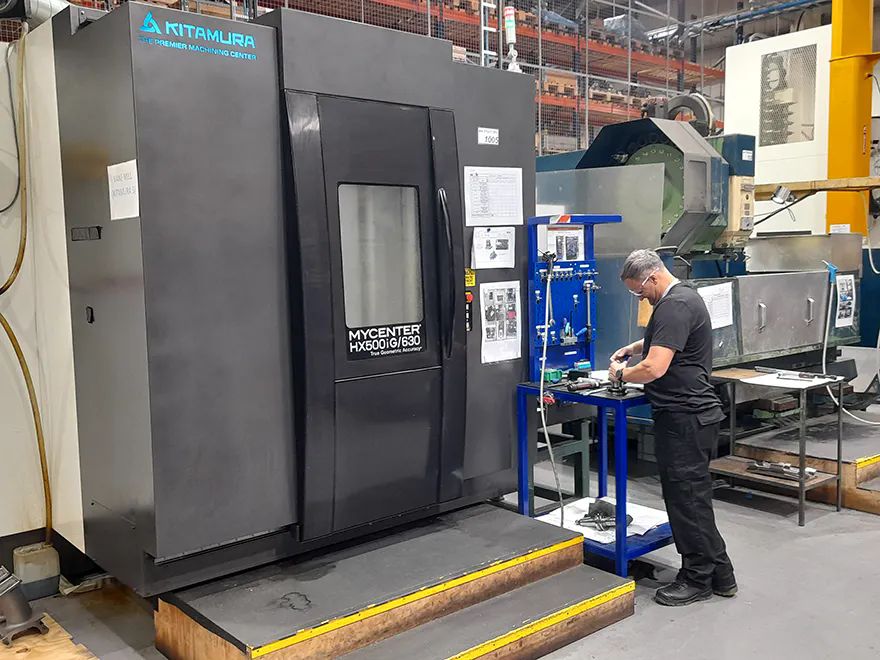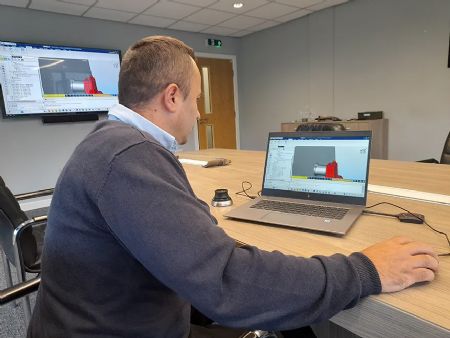 The Vericut Force trial took place on a Kitamura Mycenter HX550iG four-axis HMCELE Advanced Technologies
The Vericut Force trial took place on a Kitamura Mycenter HX550iG four-axis HMCELE Advanced Technologies, a specialist UK manufacturer of turbine components for the aerospace and power generation sectors, is achieving significant cost and efficiency gains through its adoption of
Vericut Force software. The company reports a 20% reduction in tooling costs per component and a cycle time saving of 11.2%, putting it on track to achieve a return on investment in under 12 months.
Based in Nelson, Lancashire, ELE operates from a modern facility with 180 employees and has grown substantially since its founding in 1955. Today, it supplies Tier One customers including Rolls-Royce, Safran, GE Aerospace and Siemens. The company also runs a second site in Slovakia, employing 40 people and focusing on turbine housings, while the UK facility produces hot gas path components such as turbine blades, nozzle guide vanes and seal segments.
David Dudley, technical director at ELE Advanced Technologies, explained the motivation behind the investment: “We are seeing year-on-year cost rises passed on by our suppliers, while we also experience pressure to provide customers with cost reductions. We knew Vericut Force could offset some of these cost challenges through cycle time reductions and, more significantly, by extending tool life.”
 Pictured right: Baki Huna, senior manufacturing engineer at ELE, using Vericut Force
Pictured right: Baki Huna, senior manufacturing engineer at ELE, using Vericut ForceThe company machines exotic alloys like nickel-based superalloys and titanium, which are essential for turbine performance but notoriously difficult to cut. These materials demand high-performance solid-carbide cutters, which are expensive and wear quickly. ELE trialled Vericut Force on a component for one of the world’s largest industrial gas turbine engines, machined on a Kitamura Mycenter HX550iG four-axis horizontal machining centre.
Baki Huna, senior manufacturing engineer, said: “The great thing about Vericut Force is that you have a choice. You can reduce cycle time or increase tool life, or find an agreeable balance. For this component, reducing the cost of consumables was paramount, so we were delighted to find that Vericut Force delivered up to 20% saving in tooling costs on some products. As the cutters to machine these exotic materials are expensive, it is a significant reduction, particularly when multiplied over potentially thousands of components every year.”
Longer tool lifeVericut Force works by analysing tool engagement and adjusting feed rates block by block to maintain consistent chip thickness, which is the most critical factor in machining. Unlike conventional CAM systems, which often overlook chip thinning, Force ensures optimal cutting conditions throughout the toolpath. This results in shorter cycle times and longer tool life, without compromising quality.
ELE’s commitment to quality is reflected in its AS 9100 and ISO 9001 certifications, as well as NADCAP approvals for Non-Conventional Machining and Non-Destructive Testing. The company also sees sustainability benefits from longer-lasting tools and fewer tool changes, aligning with its ‘net zero’ ambitions.
Mr Dudley said: “We estimate ROI for Vericut Force at less than 12 months. Our team of manufacturing engineers is now applying Force to several other milled components that currently demonstrate long cycle times and/or high consumable use.”
The software is also being trialled on graphite electrodes used in die-sink EDM processes, with the aim of reducing cycle times and freeing up capacity on busy machines. Mr Dudley added: “We are currently doing everything we can to meet rising market demand for additional capacity. But spending our way out of it with new machines or more floor space is expensive. Force provides a far more cost-effective solution. It also demonstrates to customers that we are proactive and innovative about alleviating cost pressures from suppliers while avoiding the need to increase prices.”